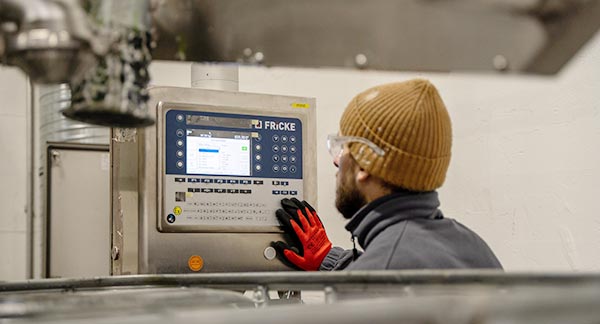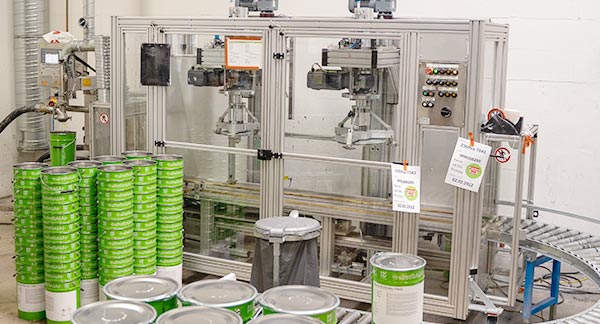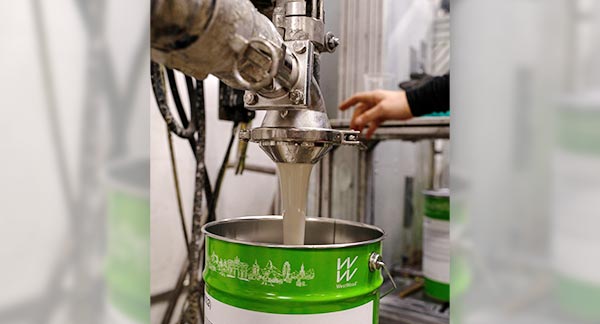The challenge of widely varying products and containers: flexible filling systems from Fricke meet high demands in plastics production
Process optimization through automated IBC filling
WestWood Kunststofftechnik GmbH produces PMMA-based liquid resin sealing and coating systems for construction work. To ensure that they adhere to various substrates, are highly resistant to weathering and withstand severe mechanical stress, for example, the products must each have a number of properties specifically designed for end uses that include multi-storey carparks, open decks, streets and bridges, as well as roofing, arcades and balconies, and for special applications such as heliports and waterproof concrete joints. Production and processing requirements also vary widely, on account of markedly differing viscosities. To expand its capacities and thereby satisfy the increasing requirements of its liquid resin systems, which are being continuously developed, WestWood has in the past two years put into operation four new filling systems from Fricke Abfülltechnik GmbH & Co. KG. These have proven reliable in use with a broad range of products and allow rapid switching between different types and sizes of container. Liquid resin experts benefit especially from the new systems’ automated filling function for intermediate bulk containers (IBCs), which improves the workflow of the entire production process in a sustainable manner.
“The oldest of our eight systems from Fricke has been in operation for 20 years,” reports Harm Stelling, Sales Director at WestWood. “Since we like to work with competent local partners and have enjoyed good experiences with filling technology specialist Fricke, it followed that we would commission the company once again to help us with our latest production expansion.” WestWood develops and produces highly reactive liquid resin systems for efficient construction work. These polymethyl methacrylate (PMMA) resins have to fulfil demands that vary as widely as applications. Requirements range from optical specifications to very short reaction times, durable elasticity and resistance to mechanical stress caused by people, furniture, vehicles and also tree roots. In addition, durable adherence to widely differing substrates is essential and the products must withstand aggressive chemicals, such as chlorides, as well as hydrolysis.
At Westwood, having a suitable system ready for every one of these requirements entails frequent product switches on the individual manufacturing lines. This in turn means that the units must be cleaned every time a product is changed, which involves repeated machine downtimes. Further, the resins are filled into a wide variety of different vessels, depending on demand, and with the old machines this required complex configuration changes or manual control of the filling processes. “For WestWood, it is essential to be able to clean the units very rapidly for product changes and they must be flexible as regards viscosity and container sizes,” explains Dirk Novak, Sales, Filling Technologies at Fricke. “The new filling systems therefore each have only three components that come into contact with the resins and they can be adjusted to the respective products and amounts within the shortest possible time on activation of the pre-stored filling programmes.”
Improved production processes in ergonomically designed stations
WestWood’s latest systems acquired to expand production comprise two FFS 31 units and one EFS 11, which were put into operation in 2020, followed by a second EFS 11 last year. The two compact EFS 11 units are used to fill open containers such as cans, buckets and hobbocks (sealed tin containers) with various materials in amounts of between 1 and 60 kg. They are distinguished by their space-saving dimensions, since they measure only about 1,000 x 800 mm, in line with Euro-palettes. “A downstream roller conveyor and a centreing device allow the container to be very easily positioned beneath the filling valve and rapidly further transported following the semi-automatic filling process,” explains Novak. “To make the process even more efficient, WestWood installed an automatic lid sealer directly downstream.”
The FFS 31 in contrast is a below-level filling system with an above-level valve, which fills containers with amounts between 200 and 1,500 kg directly on the palette. The machine operator needs only one hand to work the equipment and therefore has the semi-automatic filling process consistently within sight thanks to a control arm attached to a freely pivotable telescopic extension. Both features minimize the risk of accidents and errors during filling of fairly large containers. Production processes at WestWood benefit particularly from automated IBC filling, as Stelling confirms: “Filling of large IBCs does not have to be stopped manually, as used to be the case. This enormously increases the efficiency of the production lines.” Further, the filled containers – whether drums or large IBCs – no longer have to be shifted by hand, because they are filled directly on the palette. “Thanks to the new systems from Fricke, heavy physical work is not needed anymore, and this benefits the health of our colleagues in the long term,” adds Stelling.
Rapid adjustment to varying sizes and products
All four of the units recently put into operation at WestWood are Ex-protected and can also be adjusted within a very short time to different media and container sizes according to daily requirements in the production process. “To achieve this, we minimized the number of components on both systems that have to be cleaned to avoid cross-contamination every time a product is changed,” explains Novak. “The valves therefore each consist of only three components that come into contact with the products. These components can easily be taken apart, cleaned and re-installed by one person.” In addition, various filling programmes for the different products and different-sized containers can be stored in the machines using the integrated software and then activated on the spot by entering the programme number on the control panel.
The two companies having enjoyed 20 years of cooperation, WestWood is convinced of the efficiency and reliability of the North Rhine-Westphalian filling technology specialist. “Since we have also been using Fricke machines on all three production lines, our employees are familiar with the processes, so virtually no training was necessary,” continues Stelling. “As regards precision, cleaning and maintenance outlay, and adjustment to different viscosities, Fricke systems have never let us down.”
_________________
Fricke Abfülltechnik GmbH & Co. KG was founded in 1870 in Rehme (North Rhine-Westphalia) and began by producing decimal scales that mainly helped dealers to weigh agricultural products correctly. The product portfolio was gradually expanded, Fricke then developing bagging scales for coal and briquettes, and soon afterwards the first dosing and filling systems, which are still used in numerous industries. Today, the company offers fully and semi-automatic dosing and filling systems, together with the associated control software, for a variety of industries, including perfumes and aromas, coatings and paints, care und cleaning products, pharmaceuticals and cosmetics, foods, chemicals, adhesives, and construction chemicals and auxiliaries. Family-owned since it was founded, Fricke is currently led by a fifth-generation Managing Director and employs a staff of about 110 in Minden-Meissen – 34 of whom work in support and software development.
WestWood Kunststofftechnik GmbH was founded by Managing Partners Klaus Westphal and Kristian Grünwald in Minden in 1999. The company has been headquartered in Petershagen in east Westphalia, a few kilometres from Minden, since 2003. WestWood’s mission is the durable sealing of building components and construction areas with the most widely varying geometries. The sealing and coating systems, which are made from state-of-the-art liquid resins, are being used in 16 countries all over the world. The company has more than 140 employees, who are based in Germany, Switzerland, Austria, Great Britain, Italy and USA, und is currently setting up a further site in Poland.
_________________
Here you can » download the image data «



